Power, Politics, and Neoliberalism in International Relations
VerifiedAdded on 2023/01/23
|13
|3609
|27
Essay
AI Summary
This essay critically assesses the significance of power in both political and international relations. It defines power and explores its various forms, including compulsory, institutional, structural, and productive power. The study examines the impact of neoliberalism, analyzing the case study of free Los Angeles high school to illustrate its effects on youth, education, and the criminal justice system. The essay further discusses the relationship between power and politics/international relations, highlighting how neoliberalism shifts political aspects into economic judgments and influences international cooperation through globalization and soft power approaches. It also addresses the assumptions of anarchy and rationality in international relations, providing a comprehensive analysis of power dynamics and their implications.
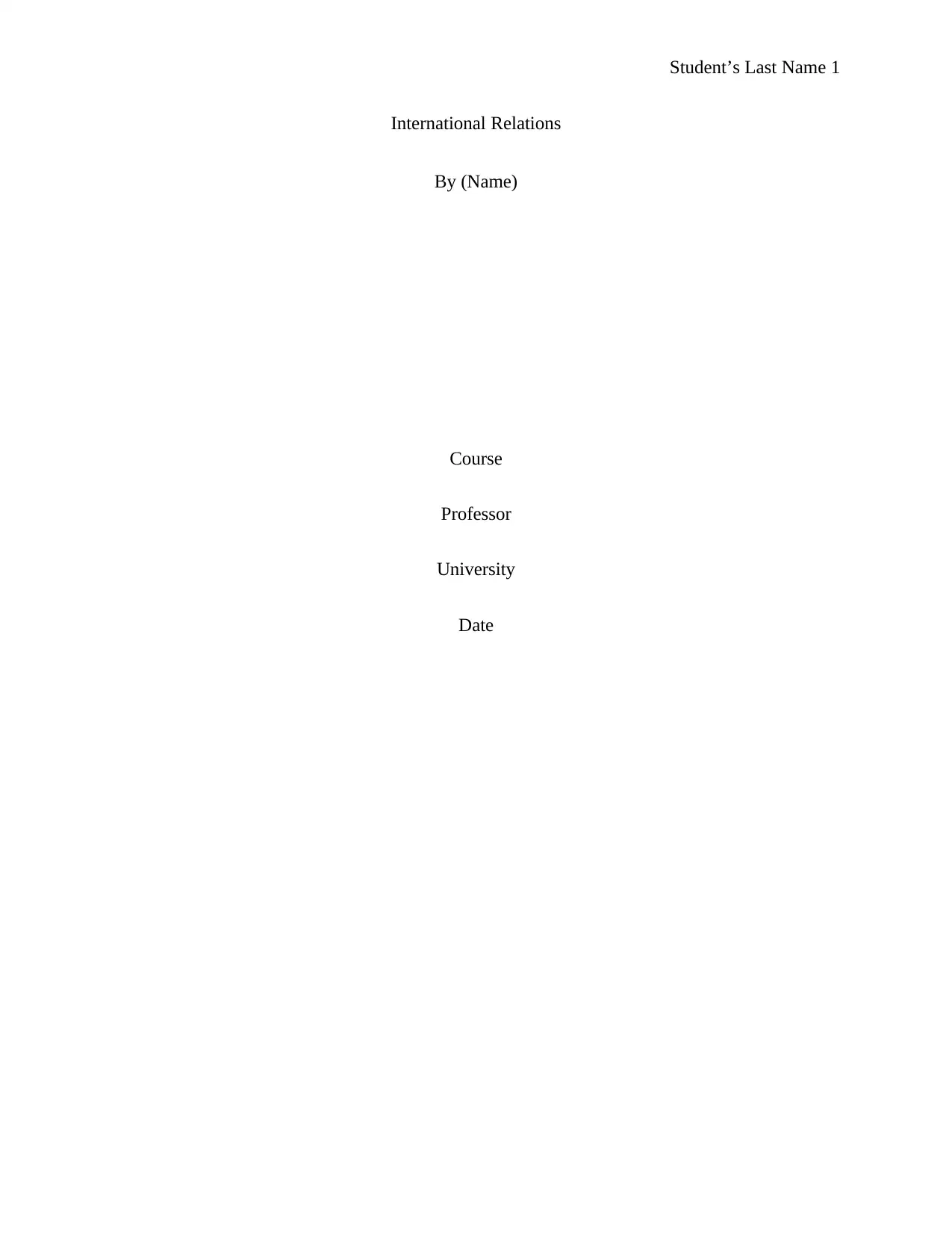
Student’s Last Name 1
International Relations
By (Name)
Course
Professor
University
Date
International Relations
By (Name)
Course
Professor
University
Date
Paraphrase This Document
Need a fresh take? Get an instant paraphrase of this document with our AI Paraphraser
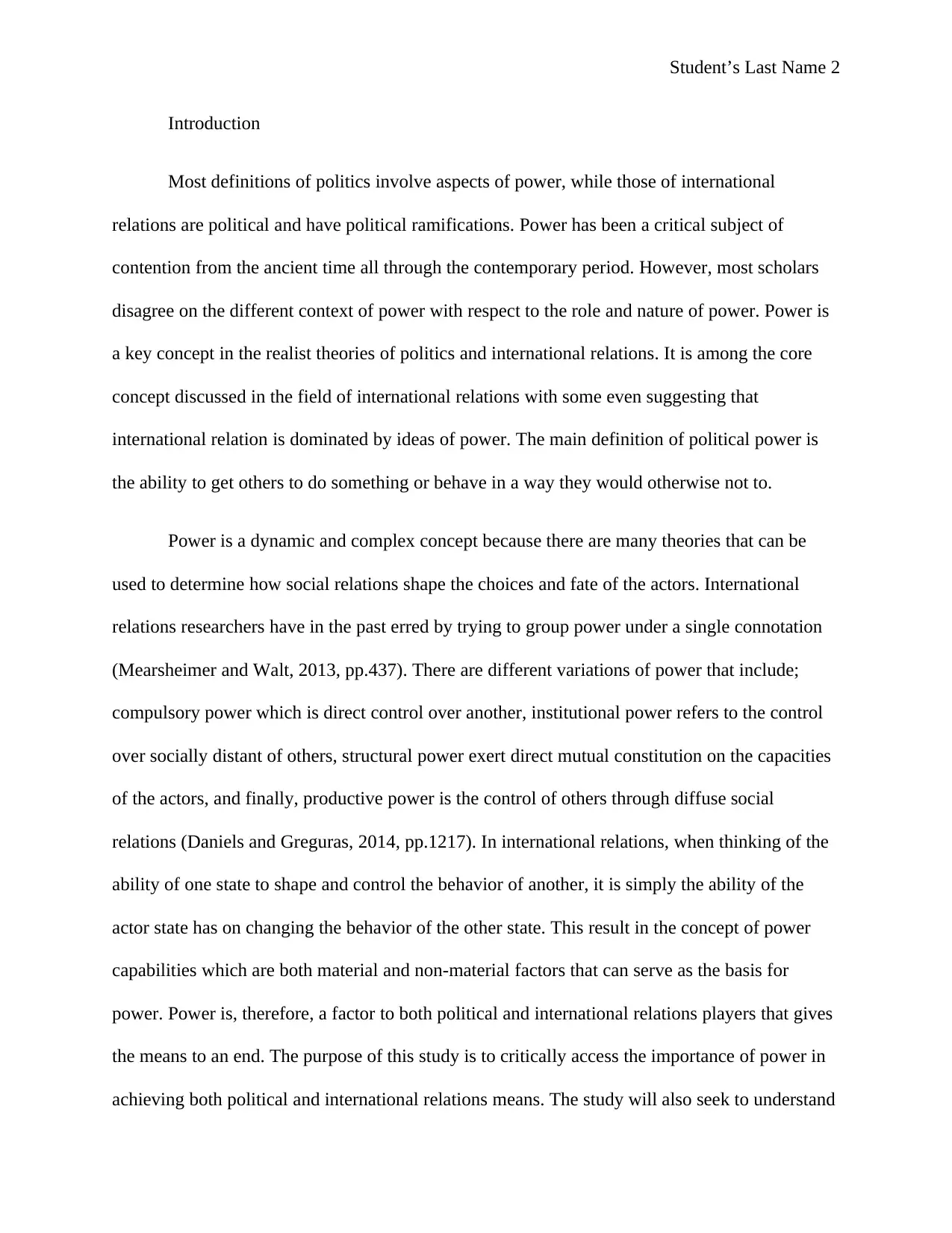
Student’s Last Name 2
Introduction
Most definitions of politics involve aspects of power, while those of international
relations are political and have political ramifications. Power has been a critical subject of
contention from the ancient time all through the contemporary period. However, most scholars
disagree on the different context of power with respect to the role and nature of power. Power is
a key concept in the realist theories of politics and international relations. It is among the core
concept discussed in the field of international relations with some even suggesting that
international relation is dominated by ideas of power. The main definition of political power is
the ability to get others to do something or behave in a way they would otherwise not to.
Power is a dynamic and complex concept because there are many theories that can be
used to determine how social relations shape the choices and fate of the actors. International
relations researchers have in the past erred by trying to group power under a single connotation
(Mearsheimer and Walt, 2013, pp.437). There are different variations of power that include;
compulsory power which is direct control over another, institutional power refers to the control
over socially distant of others, structural power exert direct mutual constitution on the capacities
of the actors, and finally, productive power is the control of others through diffuse social
relations (Daniels and Greguras, 2014, pp.1217). In international relations, when thinking of the
ability of one state to shape and control the behavior of another, it is simply the ability of the
actor state has on changing the behavior of the other state. This result in the concept of power
capabilities which are both material and non-material factors that can serve as the basis for
power. Power is, therefore, a factor to both political and international relations players that gives
the means to an end. The purpose of this study is to critically access the importance of power in
achieving both political and international relations means. The study will also seek to understand
Introduction
Most definitions of politics involve aspects of power, while those of international
relations are political and have political ramifications. Power has been a critical subject of
contention from the ancient time all through the contemporary period. However, most scholars
disagree on the different context of power with respect to the role and nature of power. Power is
a key concept in the realist theories of politics and international relations. It is among the core
concept discussed in the field of international relations with some even suggesting that
international relation is dominated by ideas of power. The main definition of political power is
the ability to get others to do something or behave in a way they would otherwise not to.
Power is a dynamic and complex concept because there are many theories that can be
used to determine how social relations shape the choices and fate of the actors. International
relations researchers have in the past erred by trying to group power under a single connotation
(Mearsheimer and Walt, 2013, pp.437). There are different variations of power that include;
compulsory power which is direct control over another, institutional power refers to the control
over socially distant of others, structural power exert direct mutual constitution on the capacities
of the actors, and finally, productive power is the control of others through diffuse social
relations (Daniels and Greguras, 2014, pp.1217). In international relations, when thinking of the
ability of one state to shape and control the behavior of another, it is simply the ability of the
actor state has on changing the behavior of the other state. This result in the concept of power
capabilities which are both material and non-material factors that can serve as the basis for
power. Power is, therefore, a factor to both political and international relations players that gives
the means to an end. The purpose of this study is to critically access the importance of power in
achieving both political and international relations means. The study will also seek to understand
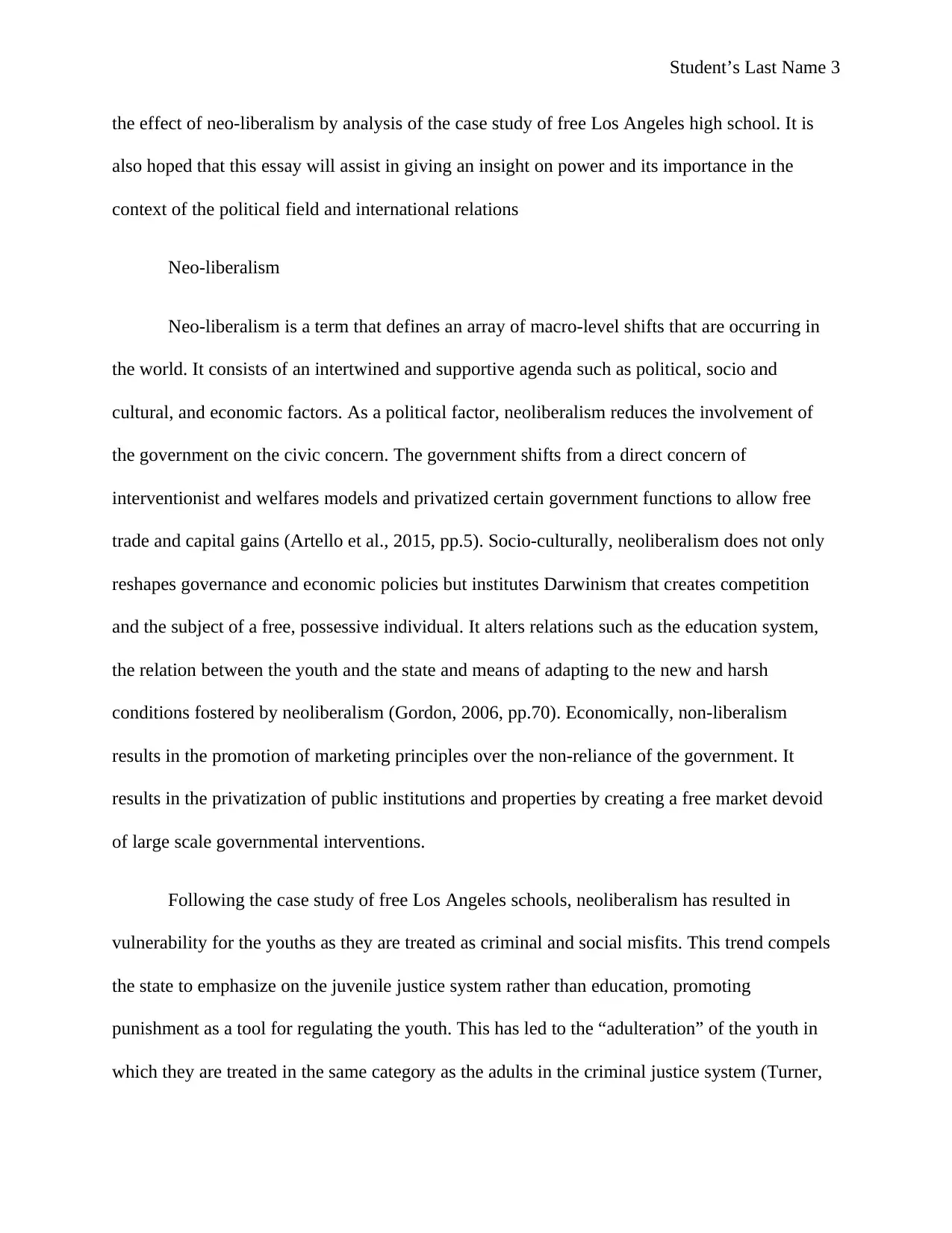
Student’s Last Name 3
the effect of neo-liberalism by analysis of the case study of free Los Angeles high school. It is
also hoped that this essay will assist in giving an insight on power and its importance in the
context of the political field and international relations
Neo-liberalism
Neo-liberalism is a term that defines an array of macro-level shifts that are occurring in
the world. It consists of an intertwined and supportive agenda such as political, socio and
cultural, and economic factors. As a political factor, neoliberalism reduces the involvement of
the government on the civic concern. The government shifts from a direct concern of
interventionist and welfares models and privatized certain government functions to allow free
trade and capital gains (Artello et al., 2015, pp.5). Socio-culturally, neoliberalism does not only
reshapes governance and economic policies but institutes Darwinism that creates competition
and the subject of a free, possessive individual. It alters relations such as the education system,
the relation between the youth and the state and means of adapting to the new and harsh
conditions fostered by neoliberalism (Gordon, 2006, pp.70). Economically, non-liberalism
results in the promotion of marketing principles over the non-reliance of the government. It
results in the privatization of public institutions and properties by creating a free market devoid
of large scale governmental interventions.
Following the case study of free Los Angeles schools, neoliberalism has resulted in
vulnerability for the youths as they are treated as criminal and social misfits. This trend compels
the state to emphasize on the juvenile justice system rather than education, promoting
punishment as a tool for regulating the youth. This has led to the “adulteration” of the youth in
which they are treated in the same category as the adults in the criminal justice system (Turner,
the effect of neo-liberalism by analysis of the case study of free Los Angeles high school. It is
also hoped that this essay will assist in giving an insight on power and its importance in the
context of the political field and international relations
Neo-liberalism
Neo-liberalism is a term that defines an array of macro-level shifts that are occurring in
the world. It consists of an intertwined and supportive agenda such as political, socio and
cultural, and economic factors. As a political factor, neoliberalism reduces the involvement of
the government on the civic concern. The government shifts from a direct concern of
interventionist and welfares models and privatized certain government functions to allow free
trade and capital gains (Artello et al., 2015, pp.5). Socio-culturally, neoliberalism does not only
reshapes governance and economic policies but institutes Darwinism that creates competition
and the subject of a free, possessive individual. It alters relations such as the education system,
the relation between the youth and the state and means of adapting to the new and harsh
conditions fostered by neoliberalism (Gordon, 2006, pp.70). Economically, non-liberalism
results in the promotion of marketing principles over the non-reliance of the government. It
results in the privatization of public institutions and properties by creating a free market devoid
of large scale governmental interventions.
Following the case study of free Los Angeles schools, neoliberalism has resulted in
vulnerability for the youths as they are treated as criminal and social misfits. This trend compels
the state to emphasize on the juvenile justice system rather than education, promoting
punishment as a tool for regulating the youth. This has led to the “adulteration” of the youth in
which they are treated in the same category as the adults in the criminal justice system (Turner,
⊘ This is a preview!⊘
Do you want full access?
Subscribe today to unlock all pages.

Trusted by 1+ million students worldwide
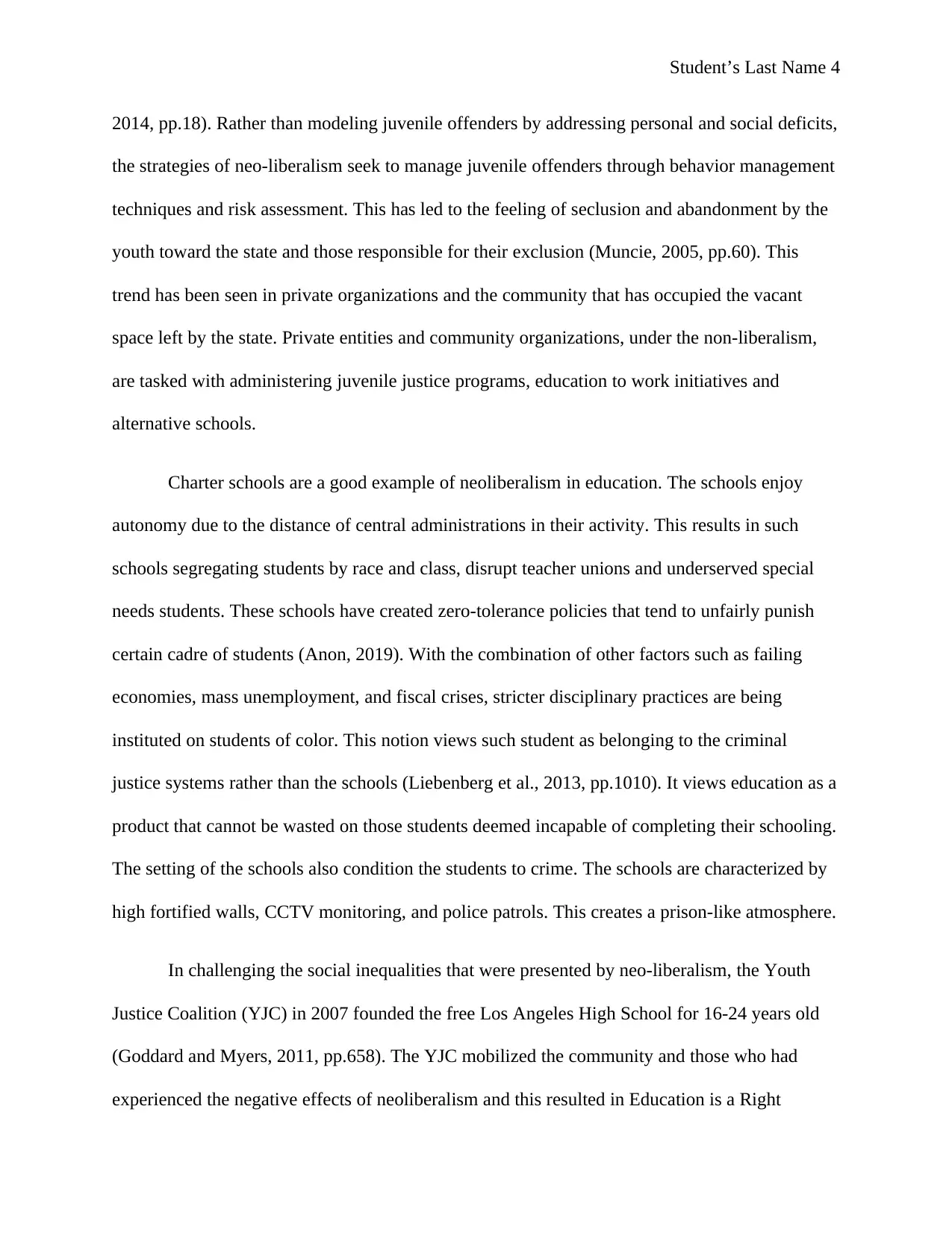
Student’s Last Name 4
2014, pp.18). Rather than modeling juvenile offenders by addressing personal and social deficits,
the strategies of neo-liberalism seek to manage juvenile offenders through behavior management
techniques and risk assessment. This has led to the feeling of seclusion and abandonment by the
youth toward the state and those responsible for their exclusion (Muncie, 2005, pp.60). This
trend has been seen in private organizations and the community that has occupied the vacant
space left by the state. Private entities and community organizations, under the non-liberalism,
are tasked with administering juvenile justice programs, education to work initiatives and
alternative schools.
Charter schools are a good example of neoliberalism in education. The schools enjoy
autonomy due to the distance of central administrations in their activity. This results in such
schools segregating students by race and class, disrupt teacher unions and underserved special
needs students. These schools have created zero-tolerance policies that tend to unfairly punish
certain cadre of students (Anon, 2019). With the combination of other factors such as failing
economies, mass unemployment, and fiscal crises, stricter disciplinary practices are being
instituted on students of color. This notion views such student as belonging to the criminal
justice systems rather than the schools (Liebenberg et al., 2013, pp.1010). It views education as a
product that cannot be wasted on those students deemed incapable of completing their schooling.
The setting of the schools also condition the students to crime. The schools are characterized by
high fortified walls, CCTV monitoring, and police patrols. This creates a prison-like atmosphere.
In challenging the social inequalities that were presented by neo-liberalism, the Youth
Justice Coalition (YJC) in 2007 founded the free Los Angeles High School for 16-24 years old
(Goddard and Myers, 2011, pp.658). The YJC mobilized the community and those who had
experienced the negative effects of neoliberalism and this resulted in Education is a Right
2014, pp.18). Rather than modeling juvenile offenders by addressing personal and social deficits,
the strategies of neo-liberalism seek to manage juvenile offenders through behavior management
techniques and risk assessment. This has led to the feeling of seclusion and abandonment by the
youth toward the state and those responsible for their exclusion (Muncie, 2005, pp.60). This
trend has been seen in private organizations and the community that has occupied the vacant
space left by the state. Private entities and community organizations, under the non-liberalism,
are tasked with administering juvenile justice programs, education to work initiatives and
alternative schools.
Charter schools are a good example of neoliberalism in education. The schools enjoy
autonomy due to the distance of central administrations in their activity. This results in such
schools segregating students by race and class, disrupt teacher unions and underserved special
needs students. These schools have created zero-tolerance policies that tend to unfairly punish
certain cadre of students (Anon, 2019). With the combination of other factors such as failing
economies, mass unemployment, and fiscal crises, stricter disciplinary practices are being
instituted on students of color. This notion views such student as belonging to the criminal
justice systems rather than the schools (Liebenberg et al., 2013, pp.1010). It views education as a
product that cannot be wasted on those students deemed incapable of completing their schooling.
The setting of the schools also condition the students to crime. The schools are characterized by
high fortified walls, CCTV monitoring, and police patrols. This creates a prison-like atmosphere.
In challenging the social inequalities that were presented by neo-liberalism, the Youth
Justice Coalition (YJC) in 2007 founded the free Los Angeles High School for 16-24 years old
(Goddard and Myers, 2011, pp.658). The YJC mobilized the community and those who had
experienced the negative effects of neoliberalism and this resulted in Education is a Right
Paraphrase This Document
Need a fresh take? Get an instant paraphrase of this document with our AI Paraphraser
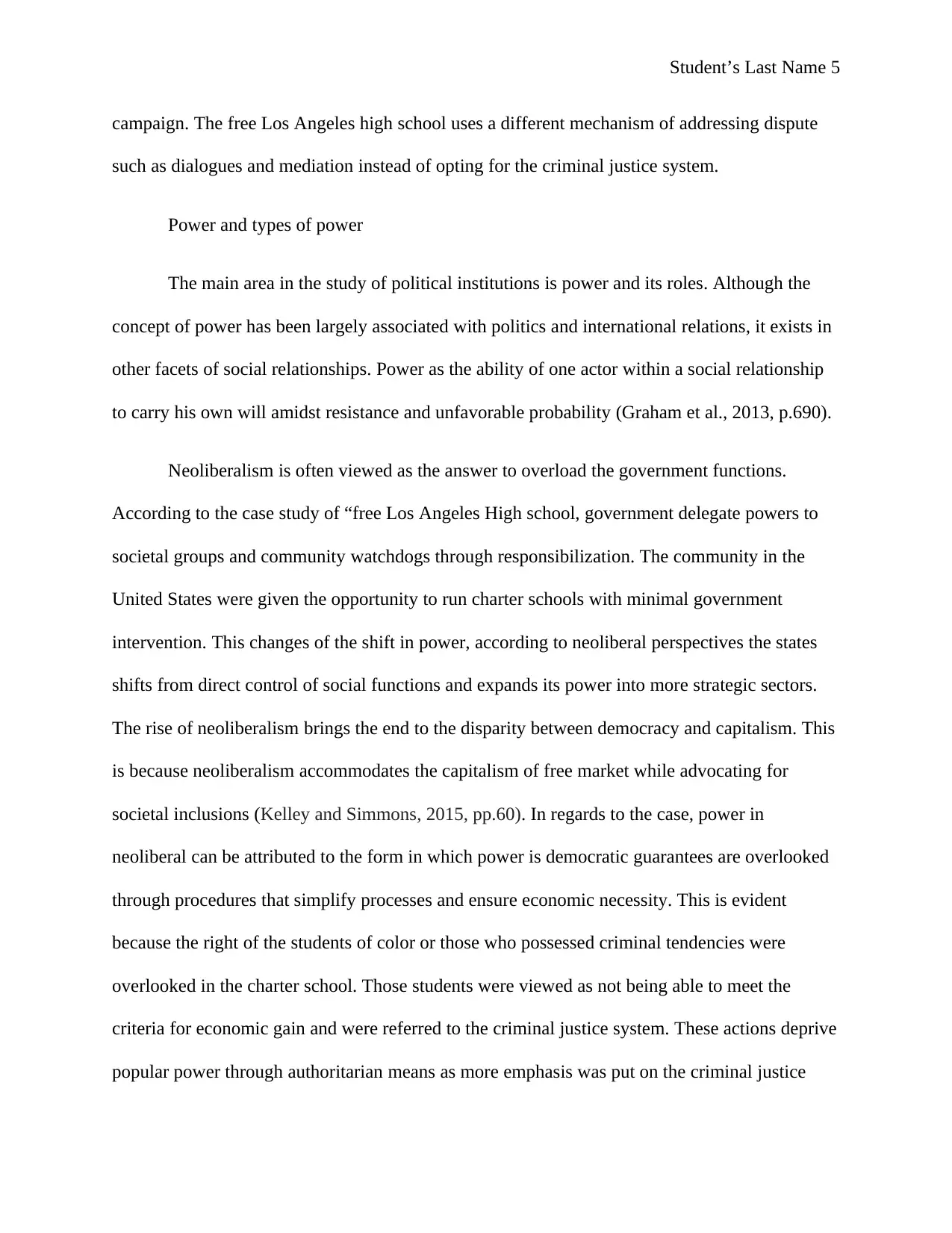
Student’s Last Name 5
campaign. The free Los Angeles high school uses a different mechanism of addressing dispute
such as dialogues and mediation instead of opting for the criminal justice system.
Power and types of power
The main area in the study of political institutions is power and its roles. Although the
concept of power has been largely associated with politics and international relations, it exists in
other facets of social relationships. Power as the ability of one actor within a social relationship
to carry his own will amidst resistance and unfavorable probability (Graham et al., 2013, p.690).
Neoliberalism is often viewed as the answer to overload the government functions.
According to the case study of “free Los Angeles High school, government delegate powers to
societal groups and community watchdogs through responsibilization. The community in the
United States were given the opportunity to run charter schools with minimal government
intervention. This changes of the shift in power, according to neoliberal perspectives the states
shifts from direct control of social functions and expands its power into more strategic sectors.
The rise of neoliberalism brings the end to the disparity between democracy and capitalism. This
is because neoliberalism accommodates the capitalism of free market while advocating for
societal inclusions (Kelley and Simmons, 2015, pp.60). In regards to the case, power in
neoliberal can be attributed to the form in which power is democratic guarantees are overlooked
through procedures that simplify processes and ensure economic necessity. This is evident
because the right of the students of color or those who possessed criminal tendencies were
overlooked in the charter school. Those students were viewed as not being able to meet the
criteria for economic gain and were referred to the criminal justice system. These actions deprive
popular power through authoritarian means as more emphasis was put on the criminal justice
campaign. The free Los Angeles high school uses a different mechanism of addressing dispute
such as dialogues and mediation instead of opting for the criminal justice system.
Power and types of power
The main area in the study of political institutions is power and its roles. Although the
concept of power has been largely associated with politics and international relations, it exists in
other facets of social relationships. Power as the ability of one actor within a social relationship
to carry his own will amidst resistance and unfavorable probability (Graham et al., 2013, p.690).
Neoliberalism is often viewed as the answer to overload the government functions.
According to the case study of “free Los Angeles High school, government delegate powers to
societal groups and community watchdogs through responsibilization. The community in the
United States were given the opportunity to run charter schools with minimal government
intervention. This changes of the shift in power, according to neoliberal perspectives the states
shifts from direct control of social functions and expands its power into more strategic sectors.
The rise of neoliberalism brings the end to the disparity between democracy and capitalism. This
is because neoliberalism accommodates the capitalism of free market while advocating for
societal inclusions (Kelley and Simmons, 2015, pp.60). In regards to the case, power in
neoliberal can be attributed to the form in which power is democratic guarantees are overlooked
through procedures that simplify processes and ensure economic necessity. This is evident
because the right of the students of color or those who possessed criminal tendencies were
overlooked in the charter school. Those students were viewed as not being able to meet the
criteria for economic gain and were referred to the criminal justice system. These actions deprive
popular power through authoritarian means as more emphasis was put on the criminal justice
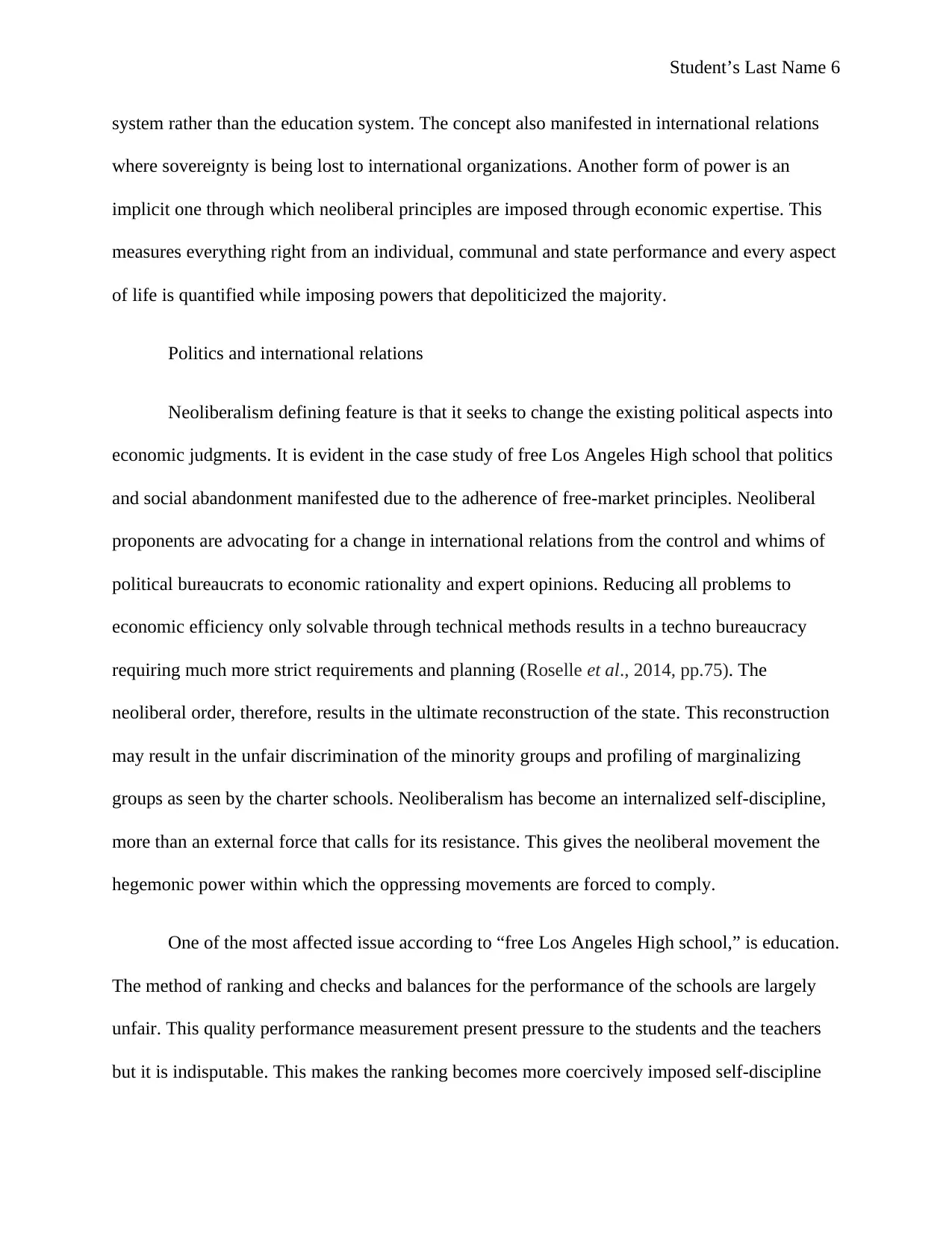
Student’s Last Name 6
system rather than the education system. The concept also manifested in international relations
where sovereignty is being lost to international organizations. Another form of power is an
implicit one through which neoliberal principles are imposed through economic expertise. This
measures everything right from an individual, communal and state performance and every aspect
of life is quantified while imposing powers that depoliticized the majority.
Politics and international relations
Neoliberalism defining feature is that it seeks to change the existing political aspects into
economic judgments. It is evident in the case study of free Los Angeles High school that politics
and social abandonment manifested due to the adherence of free-market principles. Neoliberal
proponents are advocating for a change in international relations from the control and whims of
political bureaucrats to economic rationality and expert opinions. Reducing all problems to
economic efficiency only solvable through technical methods results in a techno bureaucracy
requiring much more strict requirements and planning (Roselle et al., 2014, pp.75). The
neoliberal order, therefore, results in the ultimate reconstruction of the state. This reconstruction
may result in the unfair discrimination of the minority groups and profiling of marginalizing
groups as seen by the charter schools. Neoliberalism has become an internalized self-discipline,
more than an external force that calls for its resistance. This gives the neoliberal movement the
hegemonic power within which the oppressing movements are forced to comply.
One of the most affected issue according to “free Los Angeles High school,” is education.
The method of ranking and checks and balances for the performance of the schools are largely
unfair. This quality performance measurement present pressure to the students and the teachers
but it is indisputable. This makes the ranking becomes more coercively imposed self-discipline
system rather than the education system. The concept also manifested in international relations
where sovereignty is being lost to international organizations. Another form of power is an
implicit one through which neoliberal principles are imposed through economic expertise. This
measures everything right from an individual, communal and state performance and every aspect
of life is quantified while imposing powers that depoliticized the majority.
Politics and international relations
Neoliberalism defining feature is that it seeks to change the existing political aspects into
economic judgments. It is evident in the case study of free Los Angeles High school that politics
and social abandonment manifested due to the adherence of free-market principles. Neoliberal
proponents are advocating for a change in international relations from the control and whims of
political bureaucrats to economic rationality and expert opinions. Reducing all problems to
economic efficiency only solvable through technical methods results in a techno bureaucracy
requiring much more strict requirements and planning (Roselle et al., 2014, pp.75). The
neoliberal order, therefore, results in the ultimate reconstruction of the state. This reconstruction
may result in the unfair discrimination of the minority groups and profiling of marginalizing
groups as seen by the charter schools. Neoliberalism has become an internalized self-discipline,
more than an external force that calls for its resistance. This gives the neoliberal movement the
hegemonic power within which the oppressing movements are forced to comply.
One of the most affected issue according to “free Los Angeles High school,” is education.
The method of ranking and checks and balances for the performance of the schools are largely
unfair. This quality performance measurement present pressure to the students and the teachers
but it is indisputable. This makes the ranking becomes more coercively imposed self-discipline
⊘ This is a preview!⊘
Do you want full access?
Subscribe today to unlock all pages.

Trusted by 1+ million students worldwide
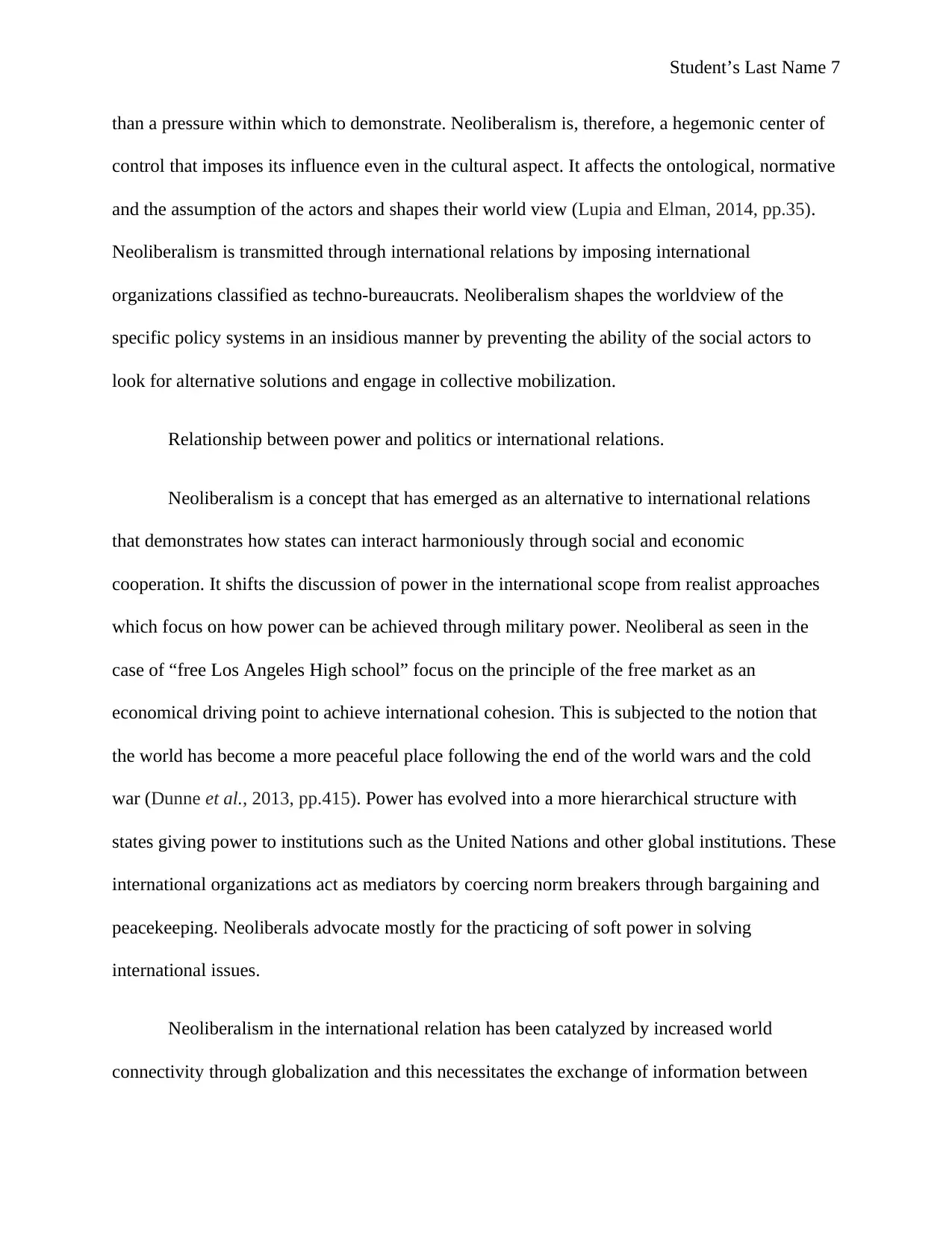
Student’s Last Name 7
than a pressure within which to demonstrate. Neoliberalism is, therefore, a hegemonic center of
control that imposes its influence even in the cultural aspect. It affects the ontological, normative
and the assumption of the actors and shapes their world view (Lupia and Elman, 2014, pp.35).
Neoliberalism is transmitted through international relations by imposing international
organizations classified as techno-bureaucrats. Neoliberalism shapes the worldview of the
specific policy systems in an insidious manner by preventing the ability of the social actors to
look for alternative solutions and engage in collective mobilization.
Relationship between power and politics or international relations.
Neoliberalism is a concept that has emerged as an alternative to international relations
that demonstrates how states can interact harmoniously through social and economic
cooperation. It shifts the discussion of power in the international scope from realist approaches
which focus on how power can be achieved through military power. Neoliberal as seen in the
case of “free Los Angeles High school” focus on the principle of the free market as an
economical driving point to achieve international cohesion. This is subjected to the notion that
the world has become a more peaceful place following the end of the world wars and the cold
war (Dunne et al., 2013, pp.415). Power has evolved into a more hierarchical structure with
states giving power to institutions such as the United Nations and other global institutions. These
international organizations act as mediators by coercing norm breakers through bargaining and
peacekeeping. Neoliberals advocate mostly for the practicing of soft power in solving
international issues.
Neoliberalism in the international relation has been catalyzed by increased world
connectivity through globalization and this necessitates the exchange of information between
than a pressure within which to demonstrate. Neoliberalism is, therefore, a hegemonic center of
control that imposes its influence even in the cultural aspect. It affects the ontological, normative
and the assumption of the actors and shapes their world view (Lupia and Elman, 2014, pp.35).
Neoliberalism is transmitted through international relations by imposing international
organizations classified as techno-bureaucrats. Neoliberalism shapes the worldview of the
specific policy systems in an insidious manner by preventing the ability of the social actors to
look for alternative solutions and engage in collective mobilization.
Relationship between power and politics or international relations.
Neoliberalism is a concept that has emerged as an alternative to international relations
that demonstrates how states can interact harmoniously through social and economic
cooperation. It shifts the discussion of power in the international scope from realist approaches
which focus on how power can be achieved through military power. Neoliberal as seen in the
case of “free Los Angeles High school” focus on the principle of the free market as an
economical driving point to achieve international cohesion. This is subjected to the notion that
the world has become a more peaceful place following the end of the world wars and the cold
war (Dunne et al., 2013, pp.415). Power has evolved into a more hierarchical structure with
states giving power to institutions such as the United Nations and other global institutions. These
international organizations act as mediators by coercing norm breakers through bargaining and
peacekeeping. Neoliberals advocate mostly for the practicing of soft power in solving
international issues.
Neoliberalism in the international relation has been catalyzed by increased world
connectivity through globalization and this necessitates the exchange of information between
Paraphrase This Document
Need a fresh take? Get an instant paraphrase of this document with our AI Paraphraser
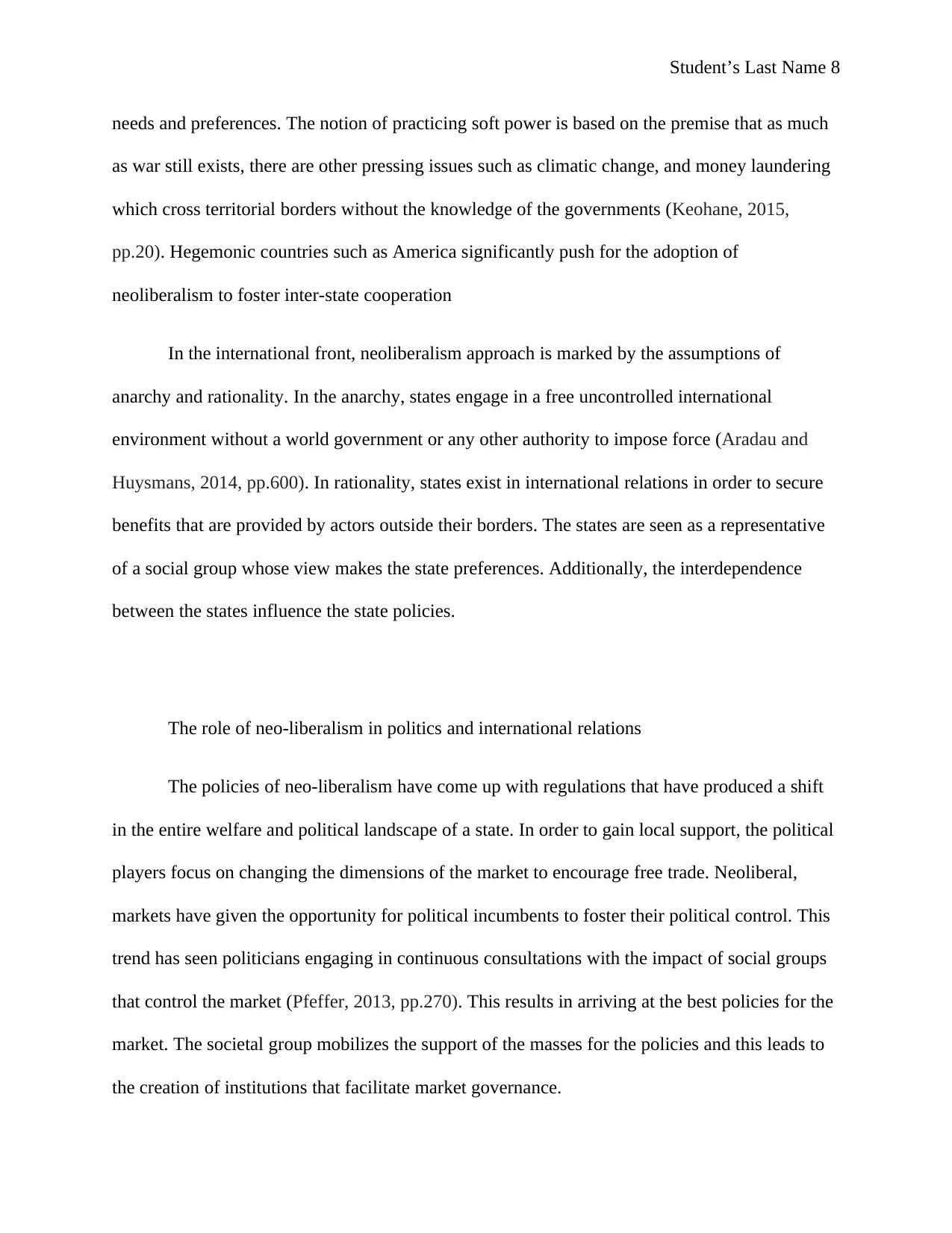
Student’s Last Name 8
needs and preferences. The notion of practicing soft power is based on the premise that as much
as war still exists, there are other pressing issues such as climatic change, and money laundering
which cross territorial borders without the knowledge of the governments (Keohane, 2015,
pp.20). Hegemonic countries such as America significantly push for the adoption of
neoliberalism to foster inter-state cooperation
In the international front, neoliberalism approach is marked by the assumptions of
anarchy and rationality. In the anarchy, states engage in a free uncontrolled international
environment without a world government or any other authority to impose force (Aradau and
Huysmans, 2014, pp.600). In rationality, states exist in international relations in order to secure
benefits that are provided by actors outside their borders. The states are seen as a representative
of a social group whose view makes the state preferences. Additionally, the interdependence
between the states influence the state policies.
The role of neo-liberalism in politics and international relations
The policies of neo-liberalism have come up with regulations that have produced a shift
in the entire welfare and political landscape of a state. In order to gain local support, the political
players focus on changing the dimensions of the market to encourage free trade. Neoliberal,
markets have given the opportunity for political incumbents to foster their political control. This
trend has seen politicians engaging in continuous consultations with the impact of social groups
that control the market (Pfeffer, 2013, pp.270). This results in arriving at the best policies for the
market. The societal group mobilizes the support of the masses for the policies and this leads to
the creation of institutions that facilitate market governance.
needs and preferences. The notion of practicing soft power is based on the premise that as much
as war still exists, there are other pressing issues such as climatic change, and money laundering
which cross territorial borders without the knowledge of the governments (Keohane, 2015,
pp.20). Hegemonic countries such as America significantly push for the adoption of
neoliberalism to foster inter-state cooperation
In the international front, neoliberalism approach is marked by the assumptions of
anarchy and rationality. In the anarchy, states engage in a free uncontrolled international
environment without a world government or any other authority to impose force (Aradau and
Huysmans, 2014, pp.600). In rationality, states exist in international relations in order to secure
benefits that are provided by actors outside their borders. The states are seen as a representative
of a social group whose view makes the state preferences. Additionally, the interdependence
between the states influence the state policies.
The role of neo-liberalism in politics and international relations
The policies of neo-liberalism have come up with regulations that have produced a shift
in the entire welfare and political landscape of a state. In order to gain local support, the political
players focus on changing the dimensions of the market to encourage free trade. Neoliberal,
markets have given the opportunity for political incumbents to foster their political control. This
trend has seen politicians engaging in continuous consultations with the impact of social groups
that control the market (Pfeffer, 2013, pp.270). This results in arriving at the best policies for the
market. The societal group mobilizes the support of the masses for the policies and this leads to
the creation of institutions that facilitate market governance.
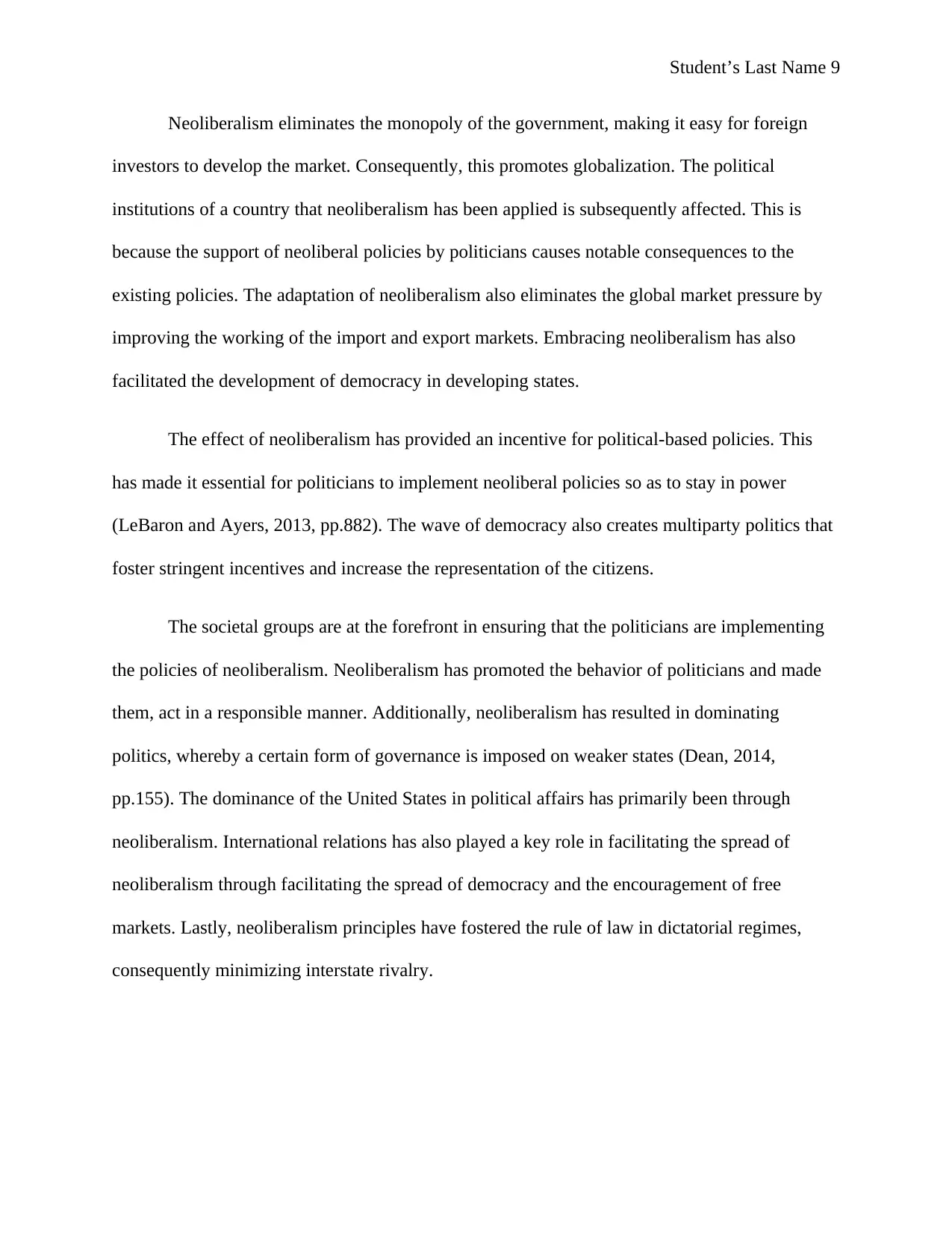
Student’s Last Name 9
Neoliberalism eliminates the monopoly of the government, making it easy for foreign
investors to develop the market. Consequently, this promotes globalization. The political
institutions of a country that neoliberalism has been applied is subsequently affected. This is
because the support of neoliberal policies by politicians causes notable consequences to the
existing policies. The adaptation of neoliberalism also eliminates the global market pressure by
improving the working of the import and export markets. Embracing neoliberalism has also
facilitated the development of democracy in developing states.
The effect of neoliberalism has provided an incentive for political-based policies. This
has made it essential for politicians to implement neoliberal policies so as to stay in power
(LeBaron and Ayers, 2013, pp.882). The wave of democracy also creates multiparty politics that
foster stringent incentives and increase the representation of the citizens.
The societal groups are at the forefront in ensuring that the politicians are implementing
the policies of neoliberalism. Neoliberalism has promoted the behavior of politicians and made
them, act in a responsible manner. Additionally, neoliberalism has resulted in dominating
politics, whereby a certain form of governance is imposed on weaker states (Dean, 2014,
pp.155). The dominance of the United States in political affairs has primarily been through
neoliberalism. International relations has also played a key role in facilitating the spread of
neoliberalism through facilitating the spread of democracy and the encouragement of free
markets. Lastly, neoliberalism principles have fostered the rule of law in dictatorial regimes,
consequently minimizing interstate rivalry.
Neoliberalism eliminates the monopoly of the government, making it easy for foreign
investors to develop the market. Consequently, this promotes globalization. The political
institutions of a country that neoliberalism has been applied is subsequently affected. This is
because the support of neoliberal policies by politicians causes notable consequences to the
existing policies. The adaptation of neoliberalism also eliminates the global market pressure by
improving the working of the import and export markets. Embracing neoliberalism has also
facilitated the development of democracy in developing states.
The effect of neoliberalism has provided an incentive for political-based policies. This
has made it essential for politicians to implement neoliberal policies so as to stay in power
(LeBaron and Ayers, 2013, pp.882). The wave of democracy also creates multiparty politics that
foster stringent incentives and increase the representation of the citizens.
The societal groups are at the forefront in ensuring that the politicians are implementing
the policies of neoliberalism. Neoliberalism has promoted the behavior of politicians and made
them, act in a responsible manner. Additionally, neoliberalism has resulted in dominating
politics, whereby a certain form of governance is imposed on weaker states (Dean, 2014,
pp.155). The dominance of the United States in political affairs has primarily been through
neoliberalism. International relations has also played a key role in facilitating the spread of
neoliberalism through facilitating the spread of democracy and the encouragement of free
markets. Lastly, neoliberalism principles have fostered the rule of law in dictatorial regimes,
consequently minimizing interstate rivalry.
⊘ This is a preview!⊘
Do you want full access?
Subscribe today to unlock all pages.

Trusted by 1+ million students worldwide
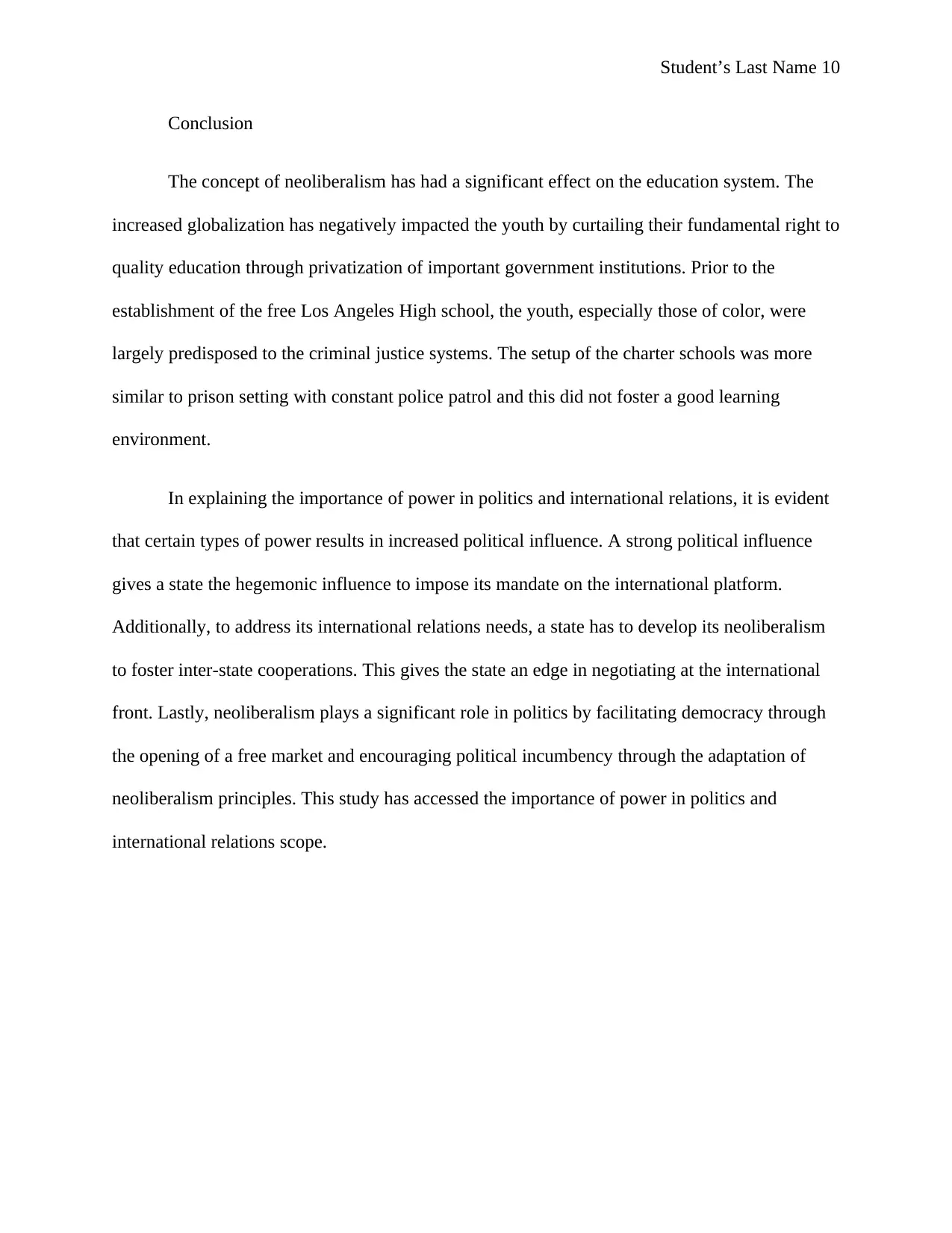
Student’s Last Name 10
Conclusion
The concept of neoliberalism has had a significant effect on the education system. The
increased globalization has negatively impacted the youth by curtailing their fundamental right to
quality education through privatization of important government institutions. Prior to the
establishment of the free Los Angeles High school, the youth, especially those of color, were
largely predisposed to the criminal justice systems. The setup of the charter schools was more
similar to prison setting with constant police patrol and this did not foster a good learning
environment.
In explaining the importance of power in politics and international relations, it is evident
that certain types of power results in increased political influence. A strong political influence
gives a state the hegemonic influence to impose its mandate on the international platform.
Additionally, to address its international relations needs, a state has to develop its neoliberalism
to foster inter-state cooperations. This gives the state an edge in negotiating at the international
front. Lastly, neoliberalism plays a significant role in politics by facilitating democracy through
the opening of a free market and encouraging political incumbency through the adaptation of
neoliberalism principles. This study has accessed the importance of power in politics and
international relations scope.
Conclusion
The concept of neoliberalism has had a significant effect on the education system. The
increased globalization has negatively impacted the youth by curtailing their fundamental right to
quality education through privatization of important government institutions. Prior to the
establishment of the free Los Angeles High school, the youth, especially those of color, were
largely predisposed to the criminal justice systems. The setup of the charter schools was more
similar to prison setting with constant police patrol and this did not foster a good learning
environment.
In explaining the importance of power in politics and international relations, it is evident
that certain types of power results in increased political influence. A strong political influence
gives a state the hegemonic influence to impose its mandate on the international platform.
Additionally, to address its international relations needs, a state has to develop its neoliberalism
to foster inter-state cooperations. This gives the state an edge in negotiating at the international
front. Lastly, neoliberalism plays a significant role in politics by facilitating democracy through
the opening of a free market and encouraging political incumbency through the adaptation of
neoliberalism principles. This study has accessed the importance of power in politics and
international relations scope.
Paraphrase This Document
Need a fresh take? Get an instant paraphrase of this document with our AI Paraphraser
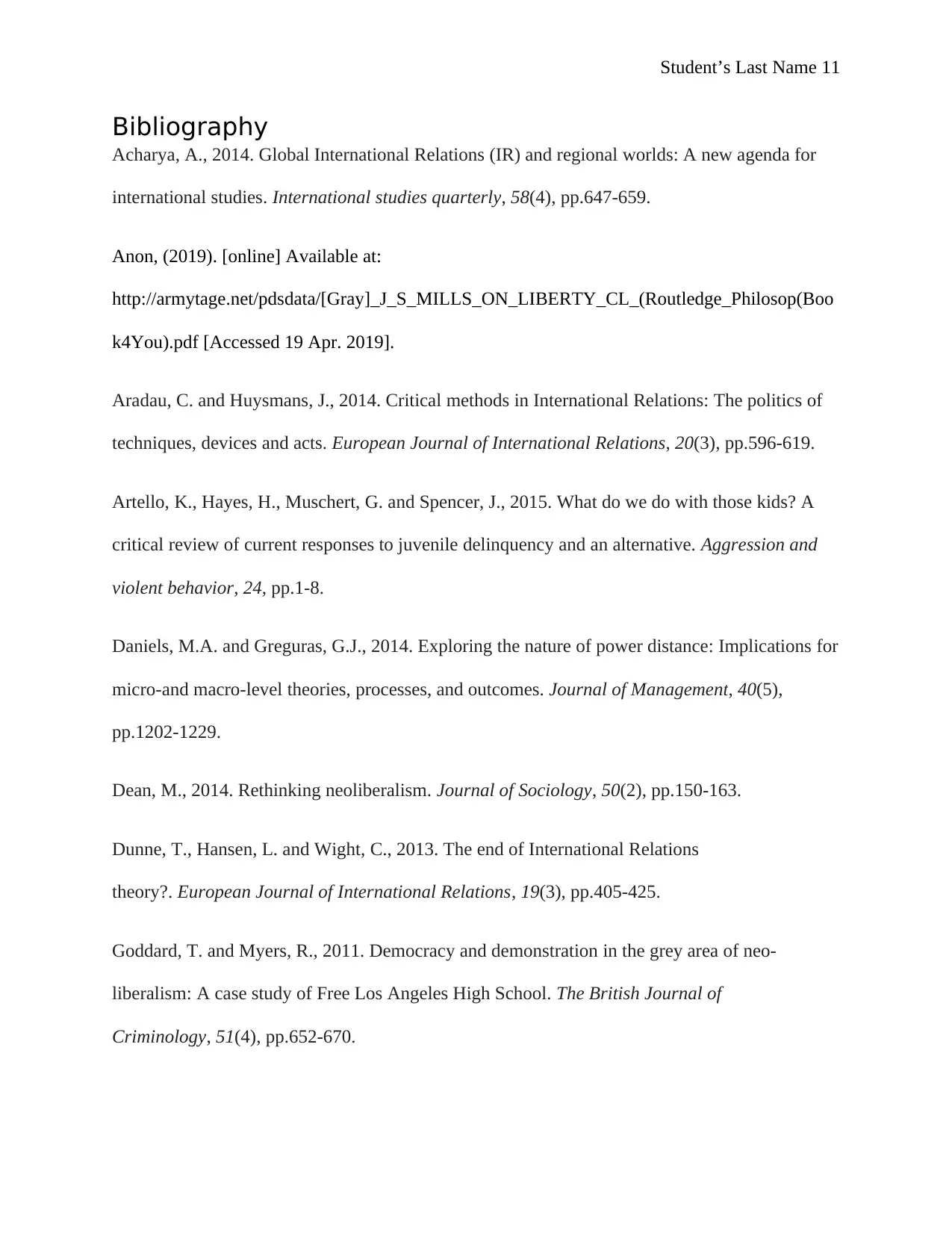
Student’s Last Name 11
Bibliography
Acharya, A., 2014. Global International Relations (IR) and regional worlds: A new agenda for
international studies. International studies quarterly, 58(4), pp.647-659.
Anon, (2019). [online] Available at:
http://armytage.net/pdsdata/[Gray]_J_S_MILLS_ON_LIBERTY_CL_(Routledge_Philosop(Boo
k4You).pdf [Accessed 19 Apr. 2019].
Aradau, C. and Huysmans, J., 2014. Critical methods in International Relations: The politics of
techniques, devices and acts. European Journal of International Relations, 20(3), pp.596-619.
Artello, K., Hayes, H., Muschert, G. and Spencer, J., 2015. What do we do with those kids? A
critical review of current responses to juvenile delinquency and an alternative. Aggression and
violent behavior, 24, pp.1-8.
Daniels, M.A. and Greguras, G.J., 2014. Exploring the nature of power distance: Implications for
micro-and macro-level theories, processes, and outcomes. Journal of Management, 40(5),
pp.1202-1229.
Dean, M., 2014. Rethinking neoliberalism. Journal of Sociology, 50(2), pp.150-163.
Dunne, T., Hansen, L. and Wight, C., 2013. The end of International Relations
theory?. European Journal of International Relations, 19(3), pp.405-425.
Goddard, T. and Myers, R., 2011. Democracy and demonstration in the grey area of neo-
liberalism: A case study of Free Los Angeles High School. The British Journal of
Criminology, 51(4), pp.652-670.
Bibliography
Acharya, A., 2014. Global International Relations (IR) and regional worlds: A new agenda for
international studies. International studies quarterly, 58(4), pp.647-659.
Anon, (2019). [online] Available at:
http://armytage.net/pdsdata/[Gray]_J_S_MILLS_ON_LIBERTY_CL_(Routledge_Philosop(Boo
k4You).pdf [Accessed 19 Apr. 2019].
Aradau, C. and Huysmans, J., 2014. Critical methods in International Relations: The politics of
techniques, devices and acts. European Journal of International Relations, 20(3), pp.596-619.
Artello, K., Hayes, H., Muschert, G. and Spencer, J., 2015. What do we do with those kids? A
critical review of current responses to juvenile delinquency and an alternative. Aggression and
violent behavior, 24, pp.1-8.
Daniels, M.A. and Greguras, G.J., 2014. Exploring the nature of power distance: Implications for
micro-and macro-level theories, processes, and outcomes. Journal of Management, 40(5),
pp.1202-1229.
Dean, M., 2014. Rethinking neoliberalism. Journal of Sociology, 50(2), pp.150-163.
Dunne, T., Hansen, L. and Wight, C., 2013. The end of International Relations
theory?. European Journal of International Relations, 19(3), pp.405-425.
Goddard, T. and Myers, R., 2011. Democracy and demonstration in the grey area of neo-
liberalism: A case study of Free Los Angeles High School. The British Journal of
Criminology, 51(4), pp.652-670.
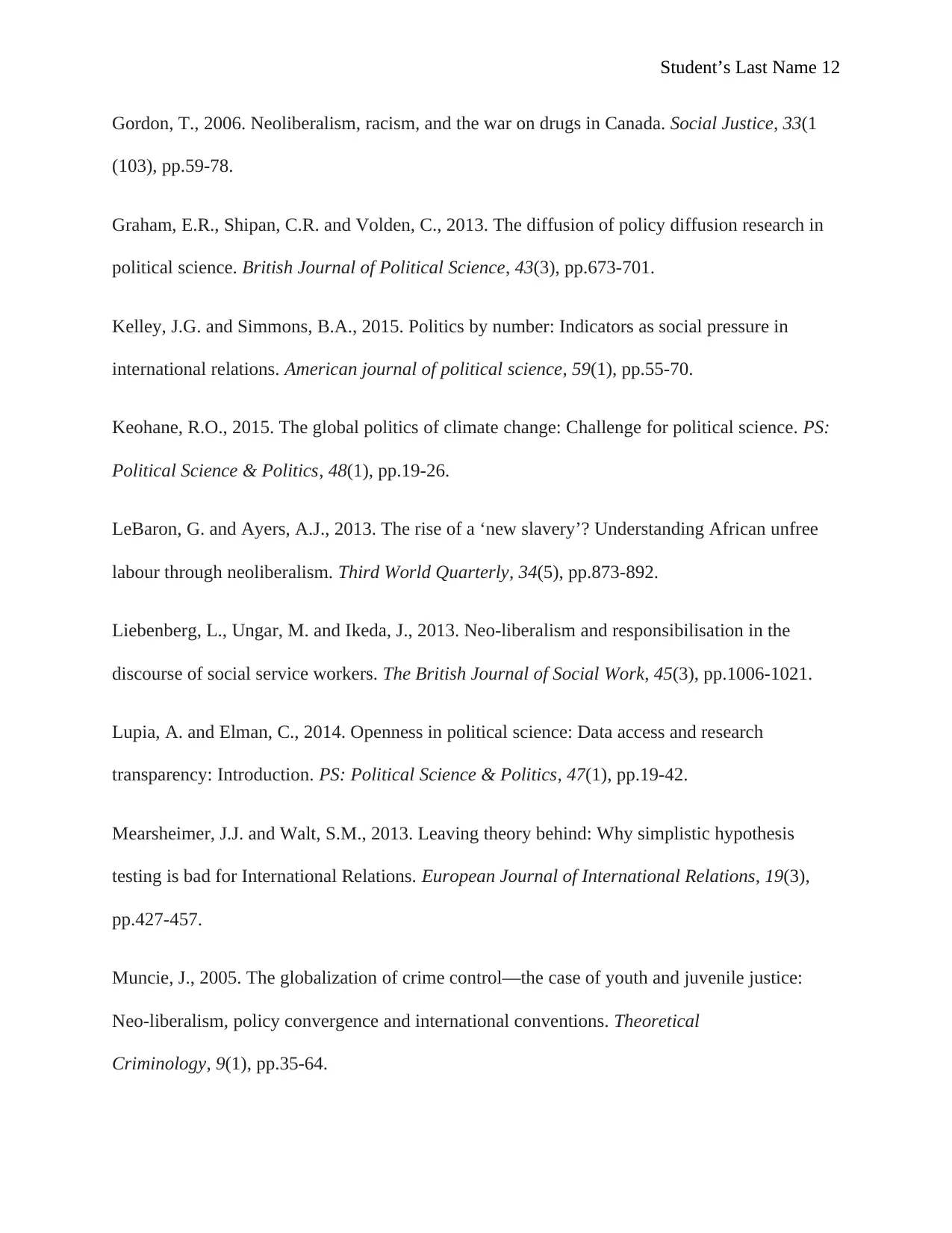
Student’s Last Name 12
Gordon, T., 2006. Neoliberalism, racism, and the war on drugs in Canada. Social Justice, 33(1
(103), pp.59-78.
Graham, E.R., Shipan, C.R. and Volden, C., 2013. The diffusion of policy diffusion research in
political science. British Journal of Political Science, 43(3), pp.673-701.
Kelley, J.G. and Simmons, B.A., 2015. Politics by number: Indicators as social pressure in
international relations. American journal of political science, 59(1), pp.55-70.
Keohane, R.O., 2015. The global politics of climate change: Challenge for political science. PS:
Political Science & Politics, 48(1), pp.19-26.
LeBaron, G. and Ayers, A.J., 2013. The rise of a ‘new slavery’? Understanding African unfree
labour through neoliberalism. Third World Quarterly, 34(5), pp.873-892.
Liebenberg, L., Ungar, M. and Ikeda, J., 2013. Neo-liberalism and responsibilisation in the
discourse of social service workers. The British Journal of Social Work, 45(3), pp.1006-1021.
Lupia, A. and Elman, C., 2014. Openness in political science: Data access and research
transparency: Introduction. PS: Political Science & Politics, 47(1), pp.19-42.
Mearsheimer, J.J. and Walt, S.M., 2013. Leaving theory behind: Why simplistic hypothesis
testing is bad for International Relations. European Journal of International Relations, 19(3),
pp.427-457.
Muncie, J., 2005. The globalization of crime control—the case of youth and juvenile justice:
Neo-liberalism, policy convergence and international conventions. Theoretical
Criminology, 9(1), pp.35-64.
Gordon, T., 2006. Neoliberalism, racism, and the war on drugs in Canada. Social Justice, 33(1
(103), pp.59-78.
Graham, E.R., Shipan, C.R. and Volden, C., 2013. The diffusion of policy diffusion research in
political science. British Journal of Political Science, 43(3), pp.673-701.
Kelley, J.G. and Simmons, B.A., 2015. Politics by number: Indicators as social pressure in
international relations. American journal of political science, 59(1), pp.55-70.
Keohane, R.O., 2015. The global politics of climate change: Challenge for political science. PS:
Political Science & Politics, 48(1), pp.19-26.
LeBaron, G. and Ayers, A.J., 2013. The rise of a ‘new slavery’? Understanding African unfree
labour through neoliberalism. Third World Quarterly, 34(5), pp.873-892.
Liebenberg, L., Ungar, M. and Ikeda, J., 2013. Neo-liberalism and responsibilisation in the
discourse of social service workers. The British Journal of Social Work, 45(3), pp.1006-1021.
Lupia, A. and Elman, C., 2014. Openness in political science: Data access and research
transparency: Introduction. PS: Political Science & Politics, 47(1), pp.19-42.
Mearsheimer, J.J. and Walt, S.M., 2013. Leaving theory behind: Why simplistic hypothesis
testing is bad for International Relations. European Journal of International Relations, 19(3),
pp.427-457.
Muncie, J., 2005. The globalization of crime control—the case of youth and juvenile justice:
Neo-liberalism, policy convergence and international conventions. Theoretical
Criminology, 9(1), pp.35-64.
⊘ This is a preview!⊘
Do you want full access?
Subscribe today to unlock all pages.

Trusted by 1+ million students worldwide
1 out of 13
Related Documents
Your All-in-One AI-Powered Toolkit for Academic Success.
+13062052269
info@desklib.com
Available 24*7 on WhatsApp / Email
![[object Object]](/_next/static/media/star-bottom.7253800d.svg)
Unlock your academic potential
Copyright © 2020–2026 A2Z Services. All Rights Reserved. Developed and managed by ZUCOL.




